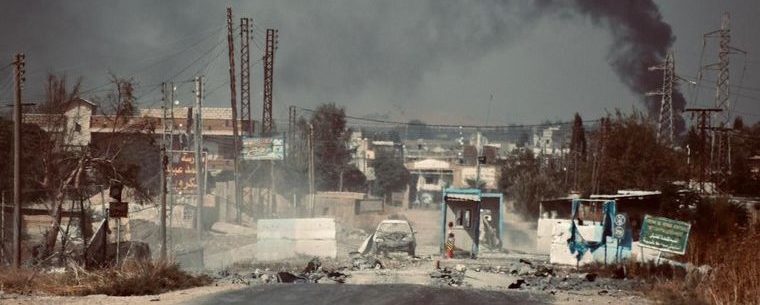Turkish-backed violations intensify in Northeast Syria: why we should not be surprised.
After months of negotiations with the U.S. on joint implementation of a “safe zone” in Northeast Syria, on 9 October key NATO member Turkey commenced unilateral incursions into the area. Its so-called “Peace Spring” operation began with the Turkish army conducting intense airstrikes and cross-border shelling on strategic military and civilian targets. This was then followed by the withdrawal of U.S. troops as Turkey’s Syrian partner factions pushed across the international border. They did so to wrest control of border-lying territories from the Syrian Democratic Forces (S.D.F) – a Kurdish-led, multi-ethnic ally of the U.S. in Syria since 2015. Turkey and its allies accuse the S.D.F of complicity in the severe destruction caused by the US’s campaign to remove the Islamic State extremists from Raqqa city.
The Turkish military and Syrian groups it has trained, equipped and coordinated – the latter operating under the umbrella of the Syrian opposition’s “National Army” – are reported to have committed a series of human rights violations since the operation began. Ranging from summary executions, unlawful attacks, impeding humanitarian access and looting, a recent Amnesty International report considers both Turkish forces and their partners to have “displayed a shameful disregard for civilian life,” finding “damning evidence of war crimes.”
Familiar violations reinforce evidence of Turkish-backed demographic change
These violations, however, should come as no surprise given the existing evidence base for similar crimes committed by the same, or related, actors in Syria’s northwestern region of Afrin. Over more than a year and a half, I have researched the widespread rights violations committed against locals in this Kurdish-majority region following the January 2018 launch of Operation Olive Branch there, another military campaign by the Turkish Armed Forces and their Syrian allies. In a study published by Germany’s Friedrich Ebert Stiftung on housing, land and property, all of my interviewees from Afrin claimed to have experienced violations at the hands of National Army factions. Amid fear of arbitrary persecution, one source stated: ‘it feels like the factions are competing for who can act the worst.’
With striking frequency during the last month, I have received reports about many of the same violations being reproduced in territories of Northeast Syria that have come under the control of Turkish-backed National Army factions. Indeed, Ahrar al-Sharqiya, a group infamous for committing violations in Afrin has already been accused of killing the prominent Kurdish politician and women’s rights activist, Hevrin Khalaf, in Northeast Syria. As inhabitants there fear an “Afrin scenario” playing out, surprisingly little has been made of these parallels within the extensive international commentary on recent events. Recognising similar patterns of violations committed in different regions of Northern Syria reinforces evidence that Turkey is advancing a strategy of demographic change.
Turkey has long considered the Syrian Kurds’ autonomous governance project on the other side of its border as a national security threat and intervened to counter what it calls an emerging ‘terror corridor.’ However, the intervention of Turkey as an external state actor with a history of forced displacement against its own Kurdish population, introduces a distinctly ethnic dimension to the analysis of these developments.
Eliminating services and instilling fear to precipitate displacement
Prior to the launch of the respective Peace Spring and Olive Branch operations, both Northeast Syria and Afrin had been administered by Kurdish-led actors since 2012. These areas had been largely spared the severe destruction seen elsewhere in the country and their stability had attracted displaced Syrians in large numbers. Just as from Afrin, the recent Turkish-backed incursions have expelled hundreds of thousands of locals in Northeast Syria.
Within their operations, the Turkish military and allies have targeted public service installations, including medical facilities in both Afrin and Northeast Syria’s Serê Kaniyê/Ras al-Ayn town. The recent Turkish targeting of Allouk water station in Northeast Syria, cutting drinking water access for some 400,000 people, is reminiscent of similar actions in Afrin that also maximised displacement. The chaotic ‘rule of the jungle’ that characterised post-Olive Branch Afrin has been replicated in Northeast Syria with instances of kidnap for ransom, arbitrary killing and intimidation.
Another consistent practice is combatants from the National Army documenting themselves while committing gruesome war crimes. The notorious video of National Army members standing over the mutilated corpse of Kurdish female fighter Barin Kobani quickly became emblematic of the savagery associated with Operation Olive Branch in Afrin. From mid-October, videos of National Army factions executing captives from Northeast Syria circulated widely on social media. The reproduction of these scenes, as well as reports of white phosphorous as a novel weapon in the Turkish arsenal, served to spread fear among the local population, inducing further civilian flight.
Occupation and relocation
Such actions effectively emptied homes of their original owners, and paved the way for Turkish-facilitated relocation to Afrin of opposition-linked fighters and their families. Amnesty International has described Turkey giving ‘free rein’ and ‘turning a blind eye’ to its Syrian partners’ violations, with locals strongly perceiving this as a reward for their participation in the operation. With Arab and Turkmen IDPs now representing the majority in some almost exclusively Kurdish locations of Afrin, there is clear evidence of violations coinciding with demographic engineering.
Worryingly, the initial signs of this process have already begun in areas of Northeast Syria under Operation Peace Spring. In Tell Abiad town, for instance, competing armed factions stake their claims to houses on an ad hoc basis by simply spray-painting their names and word “reserved” on buildings. There have also been documented reports of property looting in both Serê Kaniyê and Tell Abiad.
Hopes that the U.S. would exercise leverage following years of military presence in Northeast Syria to place conditions upon Turkey’s intervention appear tragically misplaced. Instead, with Turkish President Erdogan making increasingly explicit references about plans to relocate the Kurds from Northeast Syria, alongside reports of Turkey forcibly returning Syrian refugees, the fate of Afrin looks set to repeat.

